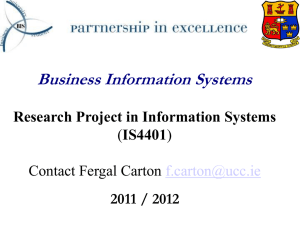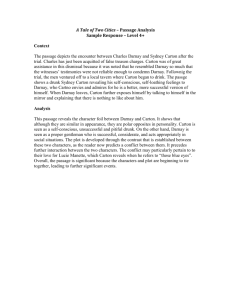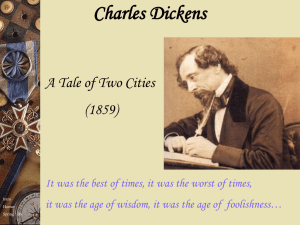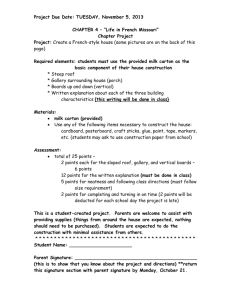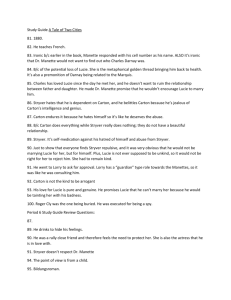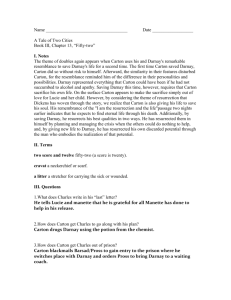A Far Better Thing”: The Heroism of A Tale of Two Cities
advertisement
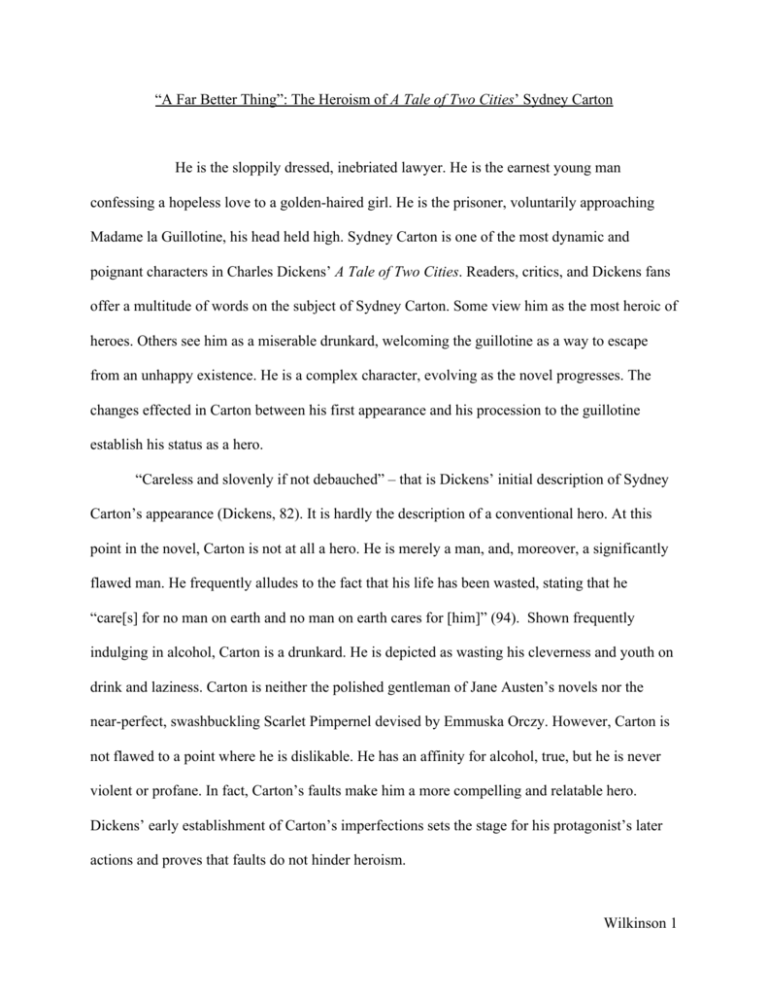
“A Far Better Thing”: The Heroism of A Tale of Two Cities’ Sydney Carton He is the sloppily dressed, inebriated lawyer. He is the earnest young man confessing a hopeless love to a golden-haired girl. He is the prisoner, voluntarily approaching Madame la Guillotine, his head held high. Sydney Carton is one of the most dynamic and poignant characters in Charles Dickens’ A Tale of Two Cities. Readers, critics, and Dickens fans offer a multitude of words on the subject of Sydney Carton. Some view him as the most heroic of heroes. Others see him as a miserable drunkard, welcoming the guillotine as a way to escape from an unhappy existence. He is a complex character, evolving as the novel progresses. The changes effected in Carton between his first appearance and his procession to the guillotine establish his status as a hero. “Careless and slovenly if not debauched” – that is Dickens’ initial description of Sydney Carton’s appearance (Dickens, 82). It is hardly the description of a conventional hero. At this point in the novel, Carton is not at all a hero. He is merely a man, and, moreover, a significantly flawed man. He frequently alludes to the fact that his life has been wasted, stating that he “care[s] for no man on earth and no man on earth cares for [him]” (94). Shown frequently indulging in alcohol, Carton is a drunkard. He is depicted as wasting his cleverness and youth on drink and laziness. Carton is neither the polished gentleman of Jane Austen’s novels nor the near-perfect, swashbuckling Scarlet Pimpernel devised by Emmuska Orczy. However, Carton is not flawed to a point where he is dislikable. He has an affinity for alcohol, true, but he is never violent or profane. In fact, Carton’s faults make him a more compelling and relatable hero. Dickens’ early establishment of Carton’s imperfections sets the stage for his protagonist’s later actions and proves that faults do not hinder heroism. Wilkinson 1 Carton is softened and changed by his love for the beautiful Lucie Manette. He becomes acquainted with Lucie and Doctor Manette at the trial of Charles Darnay in London, and is soon a familiar face at the Manette home. One night, Carton opens his heart to Lucie. As she later describes it, she sees his heart “bleeding” (240). Though in love with her, Carton fully realizes that he is not worthy of her. Many men so violently in love would pursue the woman whom they loved, regardless of anything but their own feelings. Carton is different in this respect. He candidly tells her that even had she returned his love, “he would have been conscious . . . that he would bring [her] misery, bring [her] to sorrow and repentance, blight [her], disgrace [her], pull [her] down with him.” (171) Knowing that he cannot make Lucie happy, Carton is enough of a man to step aside. Yet he is still in love with her, and before he departs, he demonstrates his love clearly. These parting words “[rise] out of [his] soul” (174). He earnestly avows that he would “give his life, to keep a life you love beside you!” (Ibid) It is here that Carton demonstrates some of his first heroic gestures. Heroism prompts him to let his rival marry the girl he loves, because he knows it is best for her. Heroism prevents him from leaving Lucie's life as a spurned lover, and instead enables him to remain a caring friend. Heroism allows him to know Lucie with a “blameless though an unchanged mind' (242) after her marriage. Through his ardent love for Lucie, Carton grows in strength of heart and begins to demonstrate heroism. Through several minor events, Dickens further develops Carton’s character and demonstrates his growing heroism. Charles Darnay, Lucie’s husband and Carton’s lookalike, is a French aristocrat sentenced to the guillotine. From the moment Carton hears of Darnay’s imminent execution, he determines to save the entire family – Darnay, Lucie, and their child – from terrible heartbreak. After Darnay’s second arrest, Carton arranges a visit to the prison in which Darnay is incarcerated. After making this arrangement, Carton spends the night wandering Wilkinson 2 the streets of Paris, collecting his thoughts and aiding a young mother across the street. Previously, he would have spent the night getting drunk. This small incident is evidence of how Carton has changed. After Darnay is convicted, Lucie falls into a faint. As always, Carton is there when he is needed, coming to her aid from “the obscure corner from which he had never moved” (387). Such is Carton’s manner throughout the novel. He enters the life of the Manettes alone, and exits it alone. Though he never receives recompense, Carton is always prepared to assist the Manettes. When Carton returns Lucie safely to her rooms, her child cries out to him, “I think you will do something to help mamma, something to save papa . . . can you, of all the people who love her, bear to see her so?” (Ibid) Before leaving, Carton kisses Lucie gently. As he does this, he murmurs a few significant words under his breath: “A life you love” (388). Referring to his earlier promise, Carton makes it clear that his coming deed is the fulfillment of that promise. It is Carton’s love for Lucie which leads to his final act of heroism. He switches place with Darnay, remaining in the cell as Darnay is carried away to safety. Soon Carton is making the trying journey through a throng of bloodthirsty Revolutionaries. Next to him stands a poor young seamstress who has turned to him for comfort. Carton’s last moments are spent comforting this girl. Not only is he dying to save the life of another, but his final actions are those of kindness to a frightened fellow human being. Before the blade of the guillotine crashes down upon Sydney Carton, he reflects upon his existence. He “see[s] the lives for which [he] lay[s] down his life” (435). His final thoughts are some of Dickens’ most immortal lines: “It is a far, far better thing that I do, than I have ever done; it is a far, far better rest that I go to than I have ever known” (Ibid). This is the end destined for Sydney Carton. He has grown in courage Wilkinson 3 and valor, from a drunk dissatisfied with life to a hero finding his calling on the bloodstained steps to the guillotine. Though it seems clear that Carton’s actions are heroic, some argue that “Carton’s death seems an act of giving up” (Morris, 18). Those who take this viewpoint see Carton’s journey as the downward path of a miserable man. They believe that, in dying, he is merely giving up on a wasted life. After all, if he is so dissatisfied with life, how is his death a sacrifice? However, this argument is heavily flawed. If Carton had truly been giving up on life, he would not have chosen a sacrifice at the guillotine as the means of doing so. Through careful reading of Dickens’ text, one can easily conclude that Carton’s sacrifice is not the natural end of a weak coward. Though Carton does realize that he has wasted his life, he does not necessarily wish for death. Carton sees the agony of Lucie, and hears the heartbroken plea of her child. With these words and images burned into his mind, he realizes that there is only one path of action to take. Contrasting his life with Darnay’s, Carton sees a wasted lawyer loved by few and a family man loved by many. Carton is not trying to escape from life. He merely realizes that in offering his life for another of more worth, he could save from heartbreak those whom he loves most upon earth. Acknowledging his wasted life, Carton is able to finally make it worthwhile in death. As death approaches, the words of the Bible flash through his mind: “I am the Resurrection and the Life, saith the Lord: he that believeth in me, though he were dead, yet shall he live: and whosoever liveth and believeth in me shall never die.” There is no convoluted reasoning or complicated psychology behind Carton’s sacrifice. In Carton’s mind and heart there is only heroic love and limitless courage. Carton’s life is not one of tragedy and misery. Instead, he grows from waste and drunkenness to love and heroism. Despite those who attempt to downplay his heroism, Carton is truly a courageous hero. Wilkinson 4 Upon studying Dickens’ novel, Carton’s heroism becomes indisputably clear. Dickens’ establishment of Carton as a flawed man merely elevates Carton as a hero, demonstrating how an ordinary, struggling human being can become extraordinary. Dickens gradually details Carton’s character growth as Carton’s love for Lucie Manette spurs him to acts of greatness. Far from the inebriated lawyer, he now “hold[s] a sanctuary in [the] hearts” of many (Dickens, 435). He is “honored and held sacred” by the woman he loves (Ibid). He has laid down his life for “a life [she] love[s]” (174). He is still Sydney Carton, but now, undoubtedly, he is a hero. Wilkinson 5 Works Cited Dickens, Charles. A Tale of Two Cities. Mumbai, India: Wilco Publishing house, 2009. Morrice, Polly Alison. Charles Dickens’ A Tale of Two Cities. Hauppauge, New York: Barrons Education Series Inc., 1984 Wilkinson 6
